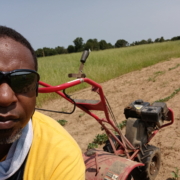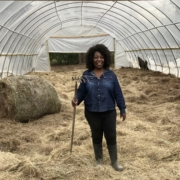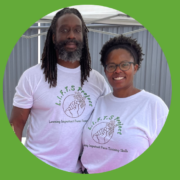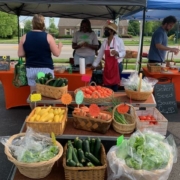Michael Stevens
Michael Stephens, an Army veteran, operates 5 A’s Veggies and Produce, located in Waynesboro, Georgia, along with other family members. He is a fifth-generation farmer who wanted more for the farm and his family when he saw the need for both healthier foods and income during the COVID-19 pandemic. He says the pandemic inspired the family farm to produce commercially as the local community suffered a “produce drought,” and that there was a need to find alternative income for workers on the farm, who are mostly family. Michael was in the corporate world before farming full-time and decided to dedicate himself fully to farming after he was given an ultimatum by his employer to relocate or be terminated.
Unlike many other commercial farms, 5 A’s Veggies and Produce does not rely on government oversight. Their goal as a farming business is to supply produce locally and regionally in a professional manner. The farm grows a variety of produce, such as purple hull peas, corn, watermelon, peaches, bell peppers, and more, making it a full-range farm. It has allowed elders of the family to make a living for themselves and interact with the local community, but when the pandemic began, and COVID-19 became a threat to everyday living, it disrupted the work of all generations.
Michael spearheaded shifting the farm operation to a greater online presence. He says that the lack of internet or broadband in the area of Georgia where the farm is located is one of the reasons their farm business has always been limited, but when he and a few other family members got together to discuss broadening the farm’s operation, their willingness to pivot from their comfort zone to something unfamiliar brought positive and successful changes. He shared that the biggest challenge to becoming more innovative in farming is being narrow-minded. Other challenges are securing contracts as a commercial farmer and transportation costs.
Overall, Michael says that transitioning the family farm to a business where paperwork and other bookkeeping are necessary for operations has also been a challenge, as he has had to learn all these things from scratch.
He prides himself in hiring farmers of color, specifically African American, because he has an end goal to get people of the African diaspora back to learning and loving the land. Because of this, he says, paying for workforce labor can be a little more costly. He says that challenges change seasonally and come and go based on cost of farm needs such as fuel but is a part of the solution.
Michael shares a bit of his experience in receiving advice from others, saying “be mindful of the information you receive because being instructed by one who has a different market than you can hinder how you envision the success of your business.” When asked what he wishes he knew as a beginner farmer that would have helped on his farming journey most, he simply said the “No’s” because it allowed him to see what his farm didn’t have and how to properly manage his farm. He notes that understanding the past, bridging the future, and understanding marketing (from a younger generation) has been a major tool for growth. He says that change itself has enabled him to change and that farming is a vehicle that can take his entire family to generational wealth and that is the drive behind his daily work.
Michael didn’t see the necessity of using social media while farming. He also did not have the means of gaining access to tools and equipment which would allow him to operate his farm more efficiently. He explained that not having a high enough credit score has prevented him from being able to access farming programs that assist with tools and equipment but that it has not stopped him from setting and reaching goals in his operation because he is self-driven. He also shared that networking has been difficult for him due to stipulations of being a farmer. He is often ridiculed for not looking like, sounding like, or even thinking like traditional and local farmers. When asked about his most impactful relationship, he mentioned Augusta Locally Grown—a local non-profit that host farmers markets for local farmers, with the majority of the farmers being women and veterans—as a great learning tool He also uses Food for All, which is an online sales platform on Facebook, but Barn to Door was the first platform he used in creating an online presence.
Michael says that he works with local organizations (some of which have told him no) but gives credit to his family as a resource and a source of ingenuity. He would love to see younger farmers more involved but organizations and other farmers need to be more welcoming of their ideas and practices. Farmers, growers, and producers of all ages who would like to expand beyond their comfort zones should be able to do so and be uplifted because some traditional practices today are a hindrance to productivity. He also notes that financial literacy should be incorporated into learning platforms so that people are able to build resilience in business operations. He quoted Andrew Matthews as saying “the best thing you can do for poor people is not be one” when asked how the community benefits from him as a farmer. He further explained what that means to him by sharing that there is wealth in farming and if you implement your best practices, you will see your benefits grow.
Michael shares that his success is being able to cater to his mom and her needs, being able to provide for and help his sister she is in need, supporting the mother of his kids, and being able to support his children in their needs. All figures of his life are those that make up the A’s in 5 A’s Veggies and Produce. He says that the greatest barriers to farming in the Black community are not understanding the power of the internet, being afraid to get involved with governmental and regional contracts, and letting go of the cash-flow mindset.











